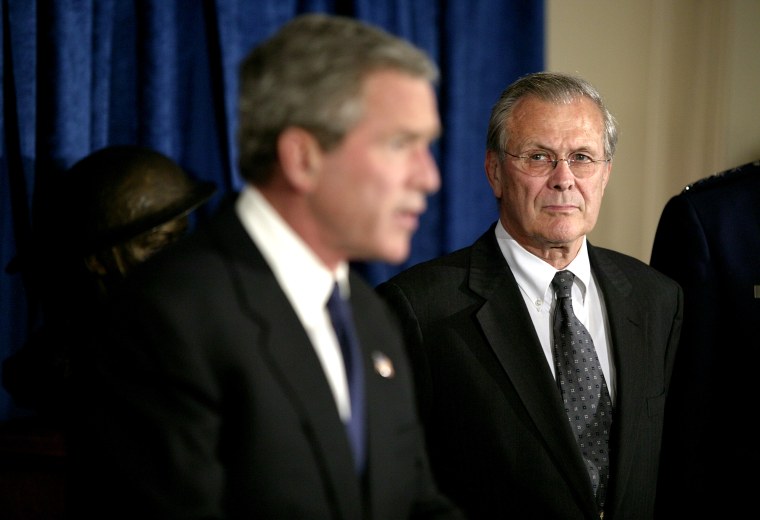Donald Rumsfeld, who served twice as defense secretary under two presidents and oversaw the wars in Afghanistan and Iraq after 9/11, has died. He was 88.
His family confirmed his death in a statement Wednesday.
"It is with deep sadness that we share the news of the passing of Donald Rumsfeld, an American statesman and devoted husband, father, grandfather and great grandfather. At 88, he was surrounded by family in his beloved Taos, New Mexico," the statement said.
"History may remember him for his extraordinary accomplishments over six decades of public service, but for those who knew him best and whose lives were forever changed as a result, we will remember his unwavering love for his wife Joyce, his family and friends, and the integrity he brought to a life dedicated to country."
The Associated Press reported that he died on Tuesday after a battle with multiple myeloma, a type of cancer.
Rumsfeld served as defense secretary to Presidents Gerald Ford from 1975 to 1977 and George W. Bush from 2001 to 2006, serving as both the youngest and second-oldest person to hold the position. He also served as Ford's White House chief of staff and as ambassador toNATO under both Ford and President Richard Nixon.
Bush praised Rumsfeld in a statement, calling him "a man of intelligence, integrity, and almost inexhaustible energy."
"He never paled before tough decisions, and never flinched from responsibility. He brought needed and timely reforms to the Department of Defense, along with a management style that stressed original thinking and accountability," Bush said. "As Commander in Chief, I especially appreciated how Don took his job personally and always looked out for the interests of our servicemen and women. He was a faithful steward of our armed forces, and the United States of America is safer and better off for his service."
Former Vice President Dick Cheney and his wife, Lynne, also praised Rumsfeld in a statement.
"We think often about the huge change he made in our lives, the events and people we would never have known without him," the statement said. "So many memories, from world-altering events to the simple enjoyments of the Chesapeake, plus all the times that we laughed together, usually at ourselves. We will miss him."
Current Secretary of Defense Lloyd Austin hailed his predecessor's "singular distinction" of having held two terms in office in two different administrations, and "his boundless energy, probing intellect, and abiding commitment to serve his country."
Rumsfeld worked for decades in public service but may be best remembered for his insistence that Iraq was harboring weapons of mass destruction and his push for the U.S. invasion of the country in 2003.
After the Sept. 11, 2001, terror attacks, Rumsfeld was the architect of the Pentagon's war on Al Qaeda in Afghanistan and the war in Iraq against Saddam Hussein, who was captured by the U.S. in 2003, nine months after the invasion. Rumsfeld faced criticism for the abuse of Iraqi prisoners at Abu Ghraib and detainees at Guantánamo Bay, Cuba.

A 2008 Senate report said Rumsfeld contributed to the abuse by authorizing aggressive interrogation techniques at Guantánamo Bay on Dec. 2, 2002, according to Reuters. Although he rescinded the authorization six weeks later, the report said word of his approval continued to spread within U.S. military circles and encouraged the use of harsh interrogations techniques in Iraq and Afghanistan.
Rumsfeld was born in Chicago in 1932 and attended Princeton on academic and military scholarships, graduating in 1954. He served in the Navy from 1954 to 1957 as an aviator and flight instructor, and later served in the reserves.
He was a congressman from Illinois for four terms, resigning in 1969 to join the Nixon administration.
He is survived by his wife, Joyce, three children and a host of grandchildren and great-grandchildren.
